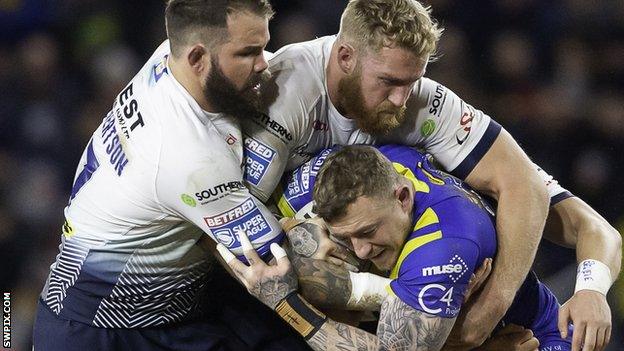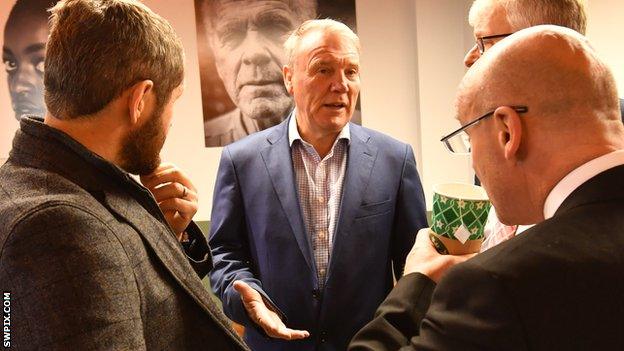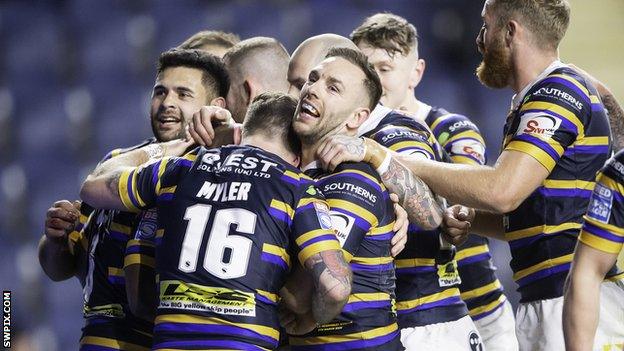Coronavirus: Reasons for optimism despite rugby league's 'biggest challenge'
- Published

Rugby league has been suspended indefinitely because of the coronavirus pandemic
Leeds Rhinos chief executive Gary Hetherington says rugby league faces the biggest challenge of its 125-year history during the coronavirus pandemic.
Hetherington says World War Two is the nearest comparison to the current crisis.
"We don't have air-raid shelters and rations, but our freedoms have been curtailed, our liberties are closed down, players have stopped playing, and fans have stopped watching," he said.
But Hetherington believes there is reason for optimism amidst the current gloom, and he outlined several key areas when he addressed an online media conference.
Rugby league is more united than it has been for a long time
"This is rugby league's biggest ever challenge in its 125th year. It's good to see the Rugby Football League and the Super League executives are working together and are engaged with our key partners.
"The Super League clubs are working really well together as well, communicating daily.
"The objective is to deliver as much of the programme as possible. The criteria is what is in the best interests of the game.
"Everything is on the table. Everyone has to contribute. All our Super League clubs are individual businesses and are often very different from each other, but the aim collectively is the survival of all 12 clubs and, by working together and with the GMB union, we believe we can deliver an effective outcome.
"Amidst the gloom there will be opportunities, we have to take advantage of the opportunities that come our way. We have to be creative and resourceful. Above all, show the traits that have defined the character of rugby league for the past 125 years.
"We have to be tough, resilient, against the odds, almost heroic."
Leeds 'the club with the biggest challenge'

Gary Hetherington says the vast majority of Leeds' players and staff have been furloughed
"Normally in sport, the club with the biggest and most diverse business, best facilities and most staff generally has an advantage.
"At Leeds Rhinos, we now class ourselves as probably the club with the biggest challenge.
"All of our income streams have been developed over many years. Conference and banqueting, corporate events, business seminars, catering, hotel, our retail operations, lottery, cafe bar - all of those incomes have run dry.
"We anticipate, probably, a £1.5m hit over the next three months from budgeted income that now won't arrive.
"But of course we still have significant commitments, not least our 150 players and staff. We've made a commitment to them to maintain their employment certainly for the next three months.
"All of the financial reserves we've built up over the many years as a profitable organisation have been invested in our new facilities. So now we're living off the cash that has been generated so far this season from our sponsors, our corporate members and our season ticket holders.
"Their continued support is absolutely crucial. But we actually need more, so we've got to be resourceful. We've got to generate new income schemes in times of crisis. We'd ask our fans to back us in whatever we do."
Why rugby league can survive this crisis
"We have got the benefit, more than other sports, that we can run our season to the end of this year and beyond the end of this year if we have to. We have got more flexibility in our sport than other sports have got.
"Taking the most pessimistic view that we don't start at all, we're talking about really serious implications for the continuing of businesses. But that of course stretches way beyond rugby league.
"I believe rugby league can come out of this intact because we have managed our financial responsibilities probably better than many other sports over the last decade or so.
"Now that gives us an advantage to manage our way through the next three, to six, to nine months.
"In other sports, their player wage bill as spiralled out of control. In rugby union, we had a similar wage bill - Premiership and Super League - about five or six years ago. But now it's a vastly different one. Rugby league has managed its salary cap pretty well.
"If the worst case scenario was to develop, we're talking about real serious implications for the country and the whole sporting and entertainment business."
Why player welfare would not be an issue if teams were asked to play three games per week to complete the season
"I think the term 'player welfare' is often misguided and misunderstood. We have a rule in the competition where you can't play within five days of the last game. Well that's going to have to go out of the window.
"We're definitely going to have to be playing, on occasions, three times a week. But for me that is not a player welfare issue. It's a performance issue.

Leeds Rhinos won four of their first five Super League games in 2020 and are third in the table, with the two clubs above them both having played two more matches
"Playing three times a week would certainly impact on performance.
"But in many ways, while it impacts on the skill level, inevitably, and fitness levels as well, it does demand real character, resilience, durability - essential qualities of rugby league.
"I would be really disappointed if I hear people whinging and whining and using player welfare as an issue about playing too many games.
"Player welfare is about all sorts of other things which are so important and very serious, but it's not about playing more games than one would hope to play.
"It would have an impact on the competition this year, because normally the team that wins the Super League competition is the most talented team, and the same can be said for the Championship.
"But this year the winners of Super League could well be the team that is not the most talented, but the team that displays the best character, the best can-do attitude, the best will to win.
"Those are the ingredients that will define the winners and indeed the losers of this year's competition. That will make this year very unique. It makes for a fascinating competition."